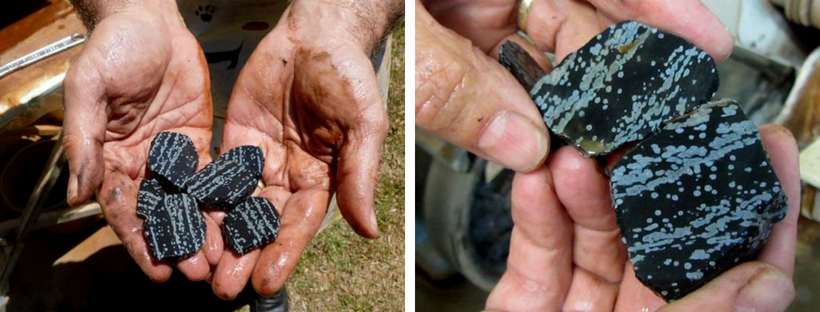
Published at 12th Jul 2018
Modified at 10th Nov 2024
How To Cut and Polish Obsidian
 The gemstone Obsidian is a natural glass formed from volcanic activity in the same way as Granite. Obsidian is 35-80% Silica and is low in water content. It has been used in tool-making and jewelry-making for centuries . Its sources are the Caucasus Mountains, Georgia, Armenia and Russia.
The gemstone Obsidian is a natural glass formed from volcanic activity in the same way as Granite. Obsidian is 35-80% Silica and is low in water content. It has been used in tool-making and jewelry-making for centuries . Its sources are the Caucasus Mountains, Georgia, Armenia and Russia.
Below are images showing rough snowflake Obsidian being cut and polished into beautiful gemstones.
How to Select Obsidian Rough
It is best to choose a piece of Obsidian rough with the least amount of cracks and visible lines. Sometimes Obsidian may crack whilst cutting along cracks. We selected a large piece to start with and cut it in half.


The best saw to use to cut or slice Obsidian is a Diamond Saw. Obsidian is easy to saw and makes the ideal stone to cut and polish. Always wear a protective mask when working with Obsidian Rough as the silica can be harmful to your health. 
Always have plenty of water running over the saw blade or polishing wheel as Obsidian, this will minimise the amount of silica dust rising into the air and being inhaled.

We used a 6 inch saw blade with 0.18 grit and 3 polishing wheels which were Diamond impregnated from 180,240 to 400 grit, then a final polish.

Obsidian is also fun to carve. Use a Dremel drill with diamond tip drill bits. They are the best and then polish with final laps or on pig skin or polish clothes.
SHOP FOR LAPIDARY SUPPLIES
Search the Gemstone Encyclopedia
Related Auctions
Related Articles
Everyone has a gemstone that corresponds with their star sign. These are also known as your Star Stone. Learn more about these stones and find out what your Star Stone is.
10th May 2018
Originally the Birthstones or gemstones were associated with a zodiac sign or the month of a individuals birth. Find out what your stone is and view the stones we have for sale
8th Feb 2021
There are so many tools on the market for testing a gemstone, but what are the main tools required for simple analysis. Lets look at four tools for gemstone testing.
4th Mar 2020
Latest Articles
Milarite is a white, green, or yellow beryllium silicate in the milarite-osumilite group. Faceted gems are rare but stunning. Discover the history, properties, prices, and benefits of milarite gems!
6th Jan 2025
Friedelite is an uncommon pink, red, or brown manganese silicate mineral best known from New Jersey and South Africa. Learn the prices, properties, uses, and history of friedelite gemstones.
23rd Dec 2024
Shortite is a rare mineral and rarer gemstone, usually found as colorless or yellow wedge-shaped crystals. Learn the value, history, and properties of shortite in this guide!
9th Dec 2024
Article Categories
How To's is where you will find helpful articles from gem Rock Auctions on how to cut gemstones, select gemstones and buy gemstones.
9 Articles





